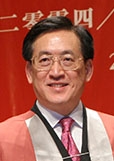
Dr the Honourable York Chow, Secretary for Health, Welfare and Food of the HKSAR Government, was Council Member of PolyU from 1998 to 2004. During his term of office, Dr Chow offered valuable insights toward the development of the University through his participation in various committees, including the Executive Committee, Honorary Degrees Committee and Estates Committee.
Dr Chow has achieved remarkable professional accomplishments while serving as President of the Hong Kong Orthopaedic Association, Hospital Chief Executive of Queen Elizabeth Hospital and Queen Mary Hospital, and Cluster Chief Executive of the Hong Kong West Cluster of the Hong Kong Hospital Authority. He is also Honorary Professor of the Department of Rehabilitation Sciences of PolyU and the Faculty of Medicine of The University of Hong Kong.
Despite his busy schedule, Dr Chow actively participates in voluntary and community work. He served as Vice Chairman of the Hong Kong Sports Development Board, Chairman of the Hong Kong Sports Association for the Physically Disabled and has been elected Vice President of the International Paralympic Committee since 1997.
(on behalf of the 2004 University Fellowship recipients)
Mr Lo, Professor Poon, Honoured Guests, Dear Friends,
It is indeed a great honour to receive the prestigious recognition of The Hong Kong Polytechnic University, and an even greater honour to speak on behalf of all the highly esteemed University Fellowship recipients, as they are all unique individuals who excel in their respective fields, and who contribute to our community through their entrepreneurship, professionalism, compassion and generosity. Due to the diversity of their achievements, it was a challenge to choose a topic which can appropriately represent this diverse group of University Fellows. Perhaps we all share the same vision of innovation and evolution, which I believe provides the impetus and motivation for us all.
I was educated in Hong Kong, and, in my time, schools demanded good academic results through memorizing texts and facts, and rote learning and regurgitation of vast tracts and quotations from teachers and other authorities. Subjects such as art, music, crafts and sports, all the things I enjoyed most, did not count. Even in medical school, students with a good, but not necessarily sustainable, memory could pass most subjects. I am glad that university systems have changed, and along with this, the quality of the graduates produced.
New ideas are often initiated by curiosity and dissatisfaction with the current status. Almost all new products, services, and even government policies were developed as a result of grievances with an existing system. In the medical sphere, the discovery of antiseptics and anaesthesia was triggered by the pain and suffering of patients and a desire to alleviate their distress. New drugs and treatment techniques were introduced following unfavourable clinical outcomes that demanded trials of new methods and procedures. Nursing care and rehabilitation services were developed due to the inadequacies and limitations of the medical profession. Welfare services were introduced due to inequality and a lack of opportunities for the disadvantaged.
New ideas can only remain as an individual's fantasy unless they can be pursued together with knowledge, research and experimentation. Medical technology development has to respect the laws of natural science. The introduction of new products has to follow market trends and consumers’ interest. The formulation of government policies also needs to address public expectations, social values and behavioural sciences. We in Hong Kong are blessed with a free, open and transparent environment, where we are constantly monitored by peers, the public and the local and international media. Indeed it is a perfect environment for innovation in practice.
This leads to the concept of evolution – a process in which improvements are made following incremental steps. This may not apply to technological changes, which often succeed with quantum leap breakthroughs and radical reforms. However, in organizational changes, evolution can allow stakeholder participation and the development of ownership within new comfort zones. My humble experience with professional bodies, healthcare institutions, universities and non-government organizations showed that sustainable reforms were often achieved through evolution rather revolution. The latter often created a destruction of trust, and long-lasting conflicts which only hindered progress and unity. Evolutional progress is particularly relevant when it applies to international organizations, where the respect of diverse traditions and cultures of the various stakeholders must be addressed. The achievement of improvements and positive outcomes can only be done in phases, with an alignment of vision and consensus building amongst different leaders.
Much of what I have just said has been a result of lessons learned from participation in voluntary and public services, and particularly as a member of The Hong Kong Polytechnic University Council. We are indebted to this University, and particularly Council Members and academic leaders in providing such experience and inspiration to us all. As the University President, Professor Poon, often reminded us at the University Council, we do not only instill knowledge and skills to our students, but we also need to inspire them to try different approaches, to take risks, to experiment, to learn from failures and successes, and to innovate in an evolutional environment.
In an academic environment, innovation can be an obsession, and even an addiction. In order to bridge research results and practical applications, the multiple scientific and social factors for sustainable evolution must be addressed.
Thank you again for giving me the opportunity to share with you some of my personal reflections. Many of this University’s innovations are evaluated, applauded and recognized every year by various awards and institutions. I look forward to seeing the progress and further advancement of The Hong Kong Polytechnic University’s academic staff and students, in their contribution to the betterment of Hong Kong and the world as a whole.
May innovation and evolution continue!



